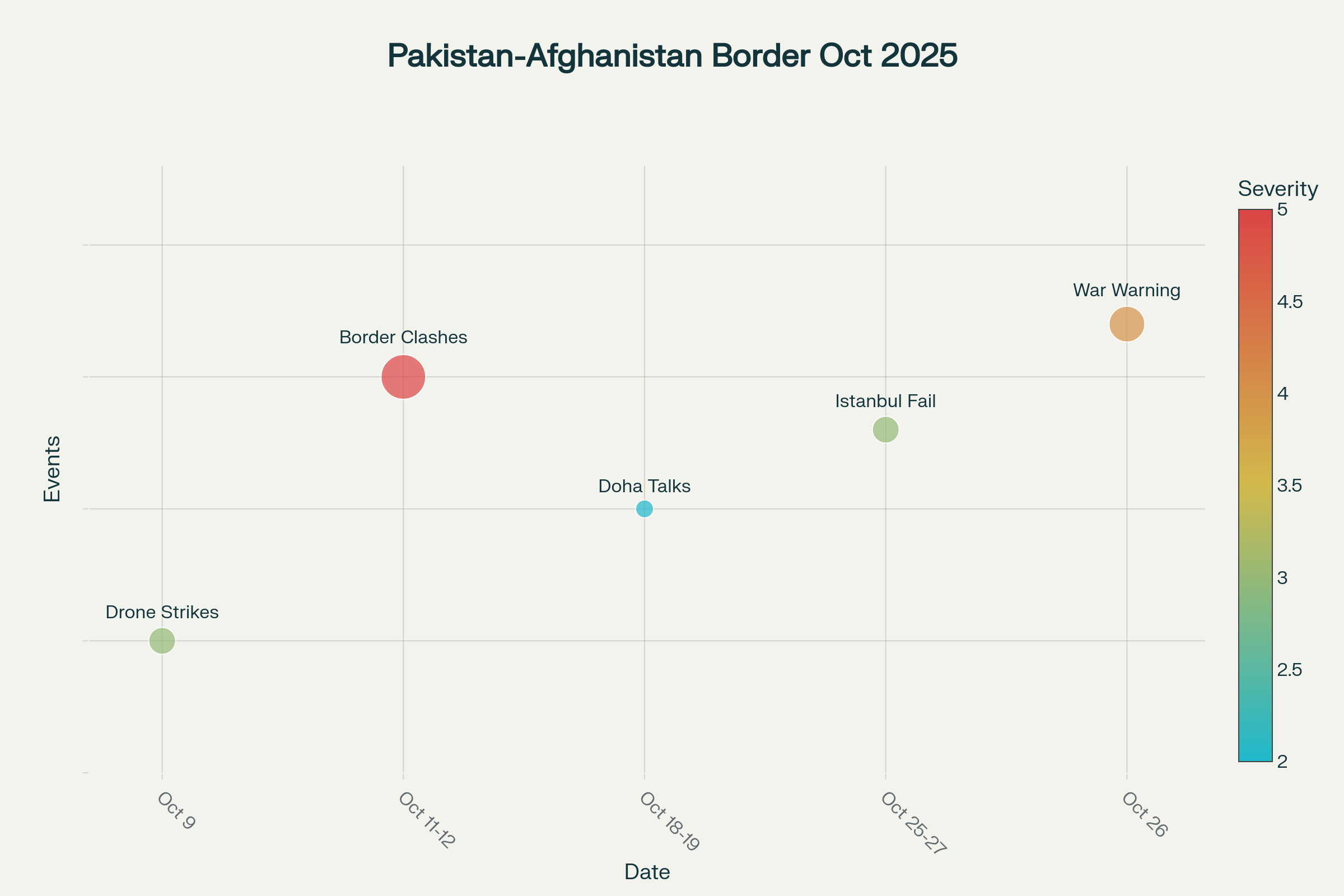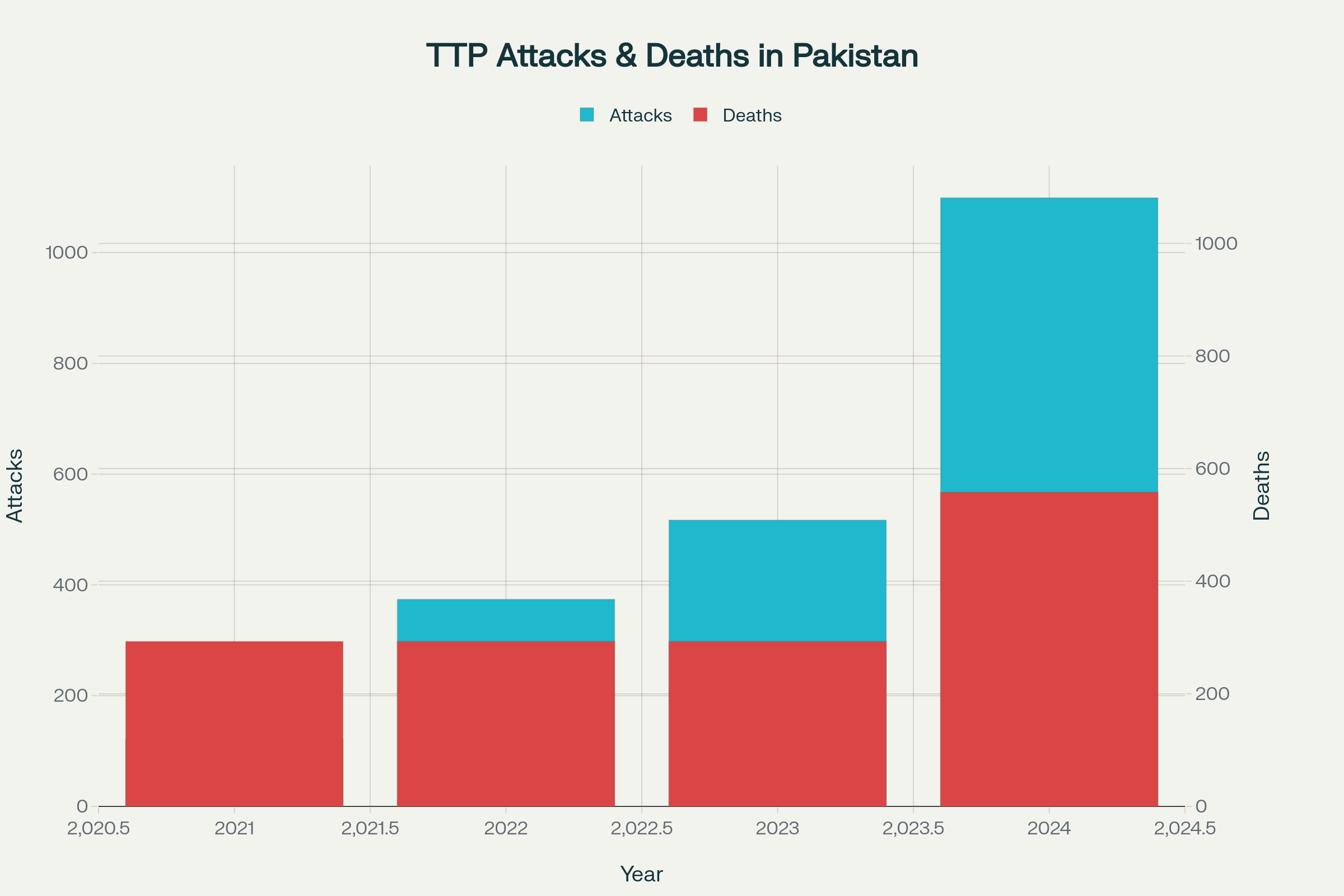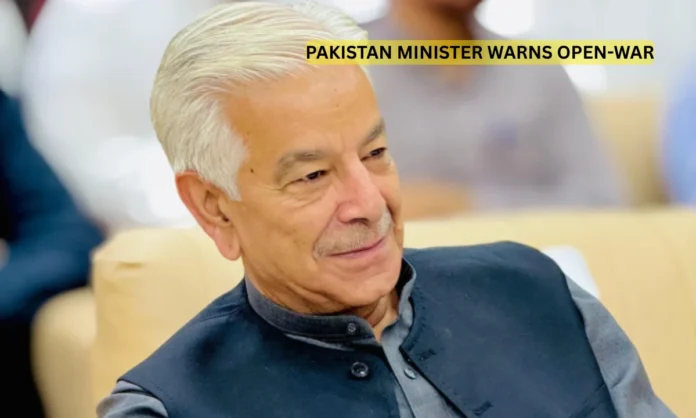Key Highlights:
- Pakistan Defence Minister Khawaja Asif issues unprecedented threat declaring “Pakistan Minister Warns Of Open War” if negotiations fail
- Second round of Pakistan-Afghanistan talks in Istanbul ended without breakthrough after three days of deadlock
- TTP attacks surge to record 1,099 incidents in 2024 with 558 deaths, marking 90% increase in terrorist fatalities
Pakistan Defence Minister Khawaja Asif has delivered an explosive ultimatum that “Pakistan Minister Warns Of Open War” with Afghanistan if ongoing peace negotiations in Istanbul fail to produce concrete counter-terrorism agreements. The escalating military rhetoric comes as the second round of Pakistan-Afghanistan peace talks, mediated by Turkey and Qatar, collapsed after three days of intensive negotiations without reaching any substantive breakthrough.
Asif’s stark declaration, delivered during a televised address in Sialkot, represents the most aggressive diplomatic posture adopted by Islamabad since the deterioration of relations following the Taliban’s return to power in Afghanistan. The minister’s statement that “Pakistan Minister Warns Of Open War” underscores Pakistan’s growing frustration with cross-border terrorism, as TTP attacks have surged to unprecedented levels with over 1,099 incidents recorded in 2024 alone.
Istanbul Talks Collapse Amid Security Demands
The Istanbul negotiations, which commenced on October 25, 2025, were designed to build upon the fragile ceasefire agreement reached in Doha following deadly cross-border clashes that killed dozens of combatants and civilians. Pakistani security officials with direct knowledge of the negotiations revealed that talks reached an impasse over Afghanistan’s reluctance to accept what Islamabad describes as “logical and legitimate demands” regarding concrete assurances that Afghan territory will not be used against Pakistan. The primary focus of Pakistan’s negotiating position centers on establishing verifiable commitments from the Afghan Taliban to eliminate the threat of the banned Tehreek-i-Taliban Pakistan (TTP) operating from Afghan soil, which prompted the stark warning where “Pakistan Minister Warns Of Open War”.
The failure of diplomatic efforts in Istanbul represents a significant setback for international mediation attempts to prevent broader military confrontation between the neighboring nations. Turkish officials, who have invested considerable diplomatic capital in facilitating these negotiations, expressed disappointment at the lack of progress despite three days of intensive discussions. Pakistan’s delegation had specifically demanded the establishment of a “third-party oversight structure,” potentially co-chaired by Turkey and Qatar, to verify compliance with counter-terrorism commitments and prevent future escalation that could lead to the “Pakistan Minister Warns Of Open War” scenario becoming reality.

Timeline of Major Pakistan-Afghanistan Crisis Events in October 2025
Terrorism Statistics Drive Military Posture
- TTP attacks in Pakistan increased from 121 incidents in 2021 to 1,099 attacks in 2024, representing over 800% surge
- Pakistan recorded 1,081 terrorism-related deaths in 2024, marking a 45% increase and ranking second globally on Global Terrorism Index
- TTP emerged as fastest-growing terrorist group globally with 90% increase in attributed deaths, responsible for 558 fatalities in 2024
- Armed Conflict Location & Event Data (ACLED) documented over 630 TTP attacks from January 2021 to September 2025
The dramatic escalation in cross-border terrorism serves as the primary catalyst behind Pakistan’s increasingly confrontational stance that led to the declaration where “Pakistan Minister Warns Of Open War”. According to official statistics from the Global Terrorism Index 2025, Pakistan experienced its deadliest year in over a decade with terrorism-related deaths rising by 45% to 1,081 fatalities. The surge in militant activity has fundamentally altered Pakistan’s strategic calculus, forcing Islamabad to adopt more aggressive diplomatic and military postures in response to what officials describe as Afghanistan’s failure to control TTP operations.
Data from the Center for Research and Security Studies (CRSS) reveals that 2025 is on track to become even deadlier than 2024, with 2,414 fatalities recorded in just the first three quarters compared to the entire 2024 toll of 2,546 deaths. The shift in casualty patterns is particularly significant, with security operations accounting for 1,265 deaths in 2025 compared to 505 in 2024, indicating Pakistan’s intensified counter-terrorism efforts in response to escalating TTP activities that prompted the warning where “Pakistan Minister Warns Of Open War”. This operational intensification reflects Pakistan’s determination to address cross-border terrorism through military means if diplomatic solutions fail to materialize.

TTP Attacks and Casualties in Pakistan (2021-2025). *2025 data represents January-September only
Border Violence Escalation Timeline
The current crisis stems from early October 2025 escalation that began with Pakistan’s unprecedented drone strikes in Kabul on October 9, marking the first direct military action against Afghan territory since 2021. The situation deteriorated rapidly on October 11-12 with fierce fighting between Taliban forces and Pakistani security personnel, resulting in at least 23 Pakistani soldiers killed and multiple outposts seized along the Durand Line. These deadly confrontations forced the closure of critical border crossings including Torkham and Chaman, disrupting trade worth millions of dollars and affecting the livelihoods of border communities dependent on cross-border commerce.
The humanitarian impact extends beyond military casualties, with United Nations data revealing that 37 civilians were killed and 425 others injured during one week of cross-border violence in October alone. The intensity of fighting prompted international concern, leading to emergency mediation efforts by Turkey and Qatar that resulted in the October 19 Doha ceasefire agreement. However, continued militant attacks and Afghanistan’s alleged reluctance to implement concrete counter-terrorism measures ultimately led to the collapse of diplomatic efforts and the inflammatory statement where “Pakistan Minister Warns Of Open War”.
| Incident Date | Event Description | Casualties | Impact |
|---|---|---|---|
| October 9, 2025 | Pakistan drone strikes in Kabul | Unconfirmed | First direct attack on Afghan territory |
| October 11-12, 2025 | Major border clashes | 23 Pakistani soldiers killed | Multiple outposts seized by Taliban |
| October 18-19, 2025 | Doha peace talks (Round 1) | N/A | Temporary ceasefire agreement |
| October 25-27, 2025 | Istanbul peace talks (Round 2) | N/A | Complete failure, no agreements |
| October 26, 2025 | “Open war” warning issued | N/A | Diplomatic relations at lowest point |
Strategic Implications and Regional Complications
Beyond immediate security concerns, the Pakistan-Afghanistan relationship faces additional complications from Afghanistan’s announced plans to construct dams on the Kunar River, potentially affecting Pakistan’s water security as a lower riparian state. Taliban Supreme Leader Hibatullah Akhundzada has instructed the Ministry of Water and Energy to begin dam construction “as soon as possible” using domestic contractors, adding another dimension to the crisis that influenced the decision where “Pakistan Minister Warns Of Open War”. This development parallels similar water disputes Pakistan faces with India over the Indus Water Treaty, creating multiple fronts of regional tension.
The geopolitical ramifications extend to Afghanistan’s enhanced diplomatic engagement with India, including Foreign Minister Amir Khan Muttaqi’s controversial October visit to New Delhi and reports of Indian technical assistance for infrastructure projects. Pakistani officials have expressed serious concerns about India’s renewed presence in Afghanistan and its potential implications for regional security dynamics, particularly regarding alleged Indian support for anti-Pakistan activities. The convergence of terrorism concerns, water disputes, and regional power competition creates a complex strategic environment that amplifies the significance of the threat where “Pakistan Minister Warns Of Open War”.
Final Assessment: Pakistan Minister Warns Of Open War Impact
The failure of Istanbul peace negotiations and the unprecedented declaration where “Pakistan Minister Warns Of Open War” marks a critical inflection point in Pakistan-Afghanistan relations with profound implications for regional stability. The dramatic surge in TTP attacks from 121 incidents in 2021 to over 1,099 in 2024, resulting in 1,081 deaths, demonstrates the urgent need for effective counter-terrorism cooperation between the neighboring countries.
Without substantive progress in addressing cross-border terrorism and establishing verifiable monitoring mechanisms, the risk of military confrontation continues to escalate, threatening to destabilize an already volatile region where the warning “Pakistan Minister Warns Of Open War” could become tragic reality. The international community’s continued mediation efforts through Turkey and Qatar represent the final opportunity to prevent open conflict along the 2,640-kilometer Durand Line border, as Pakistan’s patience with diplomatic solutions appears to be exhausted.


